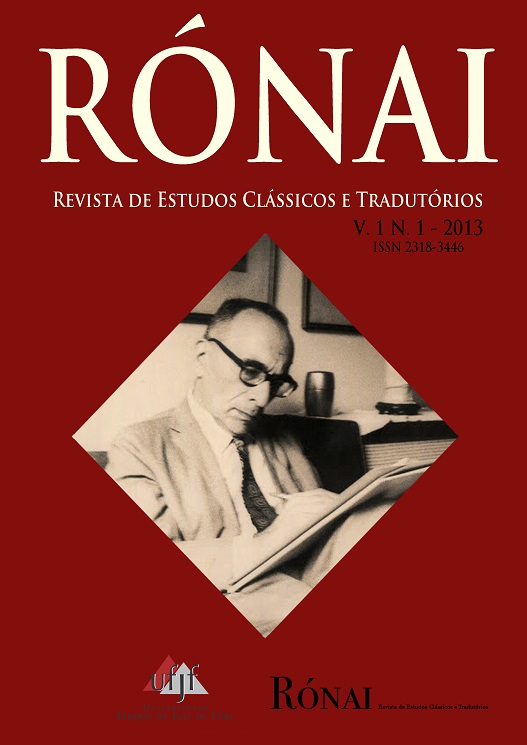Martial: Hispanus or Hispaniensis?
Keywords:
Martial, Epigram, Rome, Augusta Bilbilis, IdentityAbstract
Martial, born in Bilbilis, wouldn’t be able to resist the centripetal force from Imperial Rome. The caput mundi earned him the glory of recognition, but also consumed the poet in its bustle. Bilbilis would emerge, after 34 years spent in the Vrbs, as a refuge for an old age devoted to writing. However, only one final book has Martial written in Hispania… Accessing the invitation outlined by the work of the epigrammatic, we intend to understand how is his poetry influenced by this confrontation, raging within him, between the Bilbilitan he was born and the Roman he became.
Downloads
References
BELLINGER, A. R. Martial, the suburbanite. The Classical Journal, Chicago, v. 23, n.6, pp. 425-435, 1928.
CÍCERO, M. T. Tusculan Disputations. Translation and Edition by J. E. King. v. 18, Loeb Classical Library, Cambridge and London, Harvard University Press, 1927
CONNORS, C. Imperial space and time: The literature of leisure. In: TAPLIN, O. (ed.). Literature in the Roman World. Oxford: Oxford University Press, 2000, pp. 208-234.
COULANGES, F. La Cité Antique. Paris: Flammarion, 1984.
GRAÇA, I. Roma na Poesia de Marcial: imagens e ecos de um espaço físico e social. 447f. Tese (Doutoramento em Literatura: Literatura Latina) — Departamento de Línguas e Culturas, Universidade de Aveiro, Aveiro, 2011.
HABINEK, T. The Politics of Latin Literature: writing, identity, and Empire in Ancient Rome. Princeton and Oxford: Princeton University Press, 1998.
MARCIAL, M. V. Epigrams. Translation and Edition by D. R. Shackleton Bailey. v. 1-3, Loeb Classical Library, Cambridge, Massachusetts and London, Harvard University Press, 1993.
MARCIAL, M. V. Epigramas. Introdução e Notas de C. S. Pimentel e Tradução de D. F. Leão (Livro dos Espetáculos e Livro VII), J. L. Brandão (Livros I e II) e P. S. Ferreira (Livros III e VIII). v. 1 e 3, Clássicos Gregos e Latinos, Lisboa, Edições 70, 2000 (v. 1) e 2001 (v. 3).
OLTRAMARE, J. P. Les Épigrammes de Martial et le Témoignage qu’elles apportent sur la Société Romaine. Bulletin de l’Institut National Genevois Genève, v. 36, pp. 37- 60, 1905.
PAOLI, U. E. Rome — Its People, Life and Customs. Translated from the Italian by R. D. Macnaghten, London: Bristol Classical Press, 1990.
SÉNECA, L. A. Dialogues: Consolations. Texte établi et traduit par R. Waltz. v. 3, Collection des Universités de France — Série Latine, Paris, Les Belles Lettres, 1923.
TORRÃO, J. M.; COSTA, J. M. Inveja e Emulação em… Marcial: A vida e os seus costumes temperados com sal romano. In: PEREIRA, B. F.; DESERTO, J. (org.). Symbolon II — Inveja e Emulação. Porto: Faculdade de Letras da Universidade do Porto, 2010, pp. 71-101.
WIEDEMANN, T. The Julio-Claudian Emperors. London: Bristol Classical Press, 1997.
Downloads
Published
How to Cite
Issue
Section
License
Copyright (c) 2015 Rónai – Revista de Estudos Clássicos e Tradutórios

This work is licensed under a Creative Commons Attribution 4.0 International License.
Copyright
The authors of the published contributions agree with the following items:
1. The authors keep the copyright and convey to the journal the right of first publication, the work being licensed under a Creative Commons Attribution License 4.0 International.
2. The authors are allowed and stimulated to publicize and distribute their work online after the publication in the journal, recognizing first publication in this journal.
3. The authors of the approved works authorize the journal to distribute their content, after publication, for reproduction in content indexes, virtual libraries and similars.
For more information about Creative Commons Attribution License 4.0 International, please, go to: https://creativecommons.org/licenses/by/4.0/deed.en
Editorial exemption
The authors of the published contributions are entirely and exclusively responsible for their contents. Its content does not represent an official position of Rónai - Revista de Estudos Clássicos e Tradutórios neither of Faculdade de Letras da Universidade Federal de Juiz de Fora or their partner institutions.



